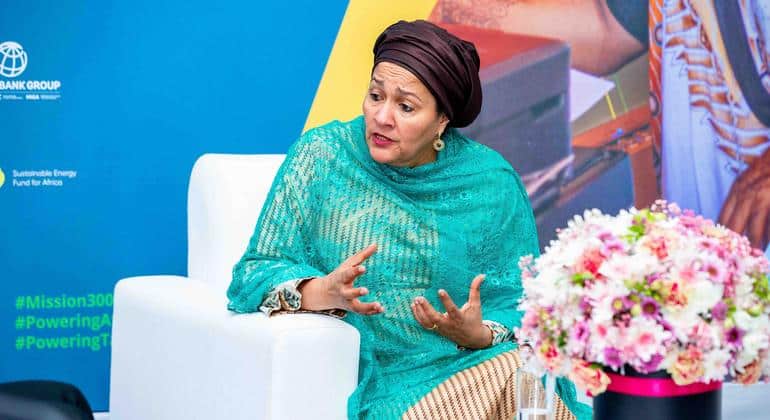Deputy Secretary-General Emphasizes Importance of Investment for Development in Africa at High-level Political Forum’s Africa Day

It is with great honor that UN Deputy Secretary-General Amina Mohammed addressed attendees at the High-Level Political Forum 2025, marking Africa Day. In her remarks, she highlighted the continent’s remarkable journey toward sustainable development, emphasizing resilience in the face of historical and ongoing challenges. Despite colonial legacies, climate crises, and conflicts, African nations are making significant strides, as evidenced by ten countries presenting their Voluntary National Reviews this year. These reviews showcase the continent’s commitment to the goals outlined in Agenda 2063 and the 2030 Agenda for Sustainable Development.
Acknowledging Progress Amidst Challenges
Amina Mohammed underscored the importance of recognizing Africa’s progress while acknowledging the substantial challenges that remain. She pointed out that many African nations began their development journeys under difficult circumstances, grappling with the repercussions of colonialism, climate change, and ongoing conflicts. For instance, the situation in Sudan, where conflict has devastated factories and led to soaring unemployment, serves as a stark reminder that progress is not always linear or guaranteed.
Despite these challenges, the Deputy Secretary-General celebrated the achievements of several countries. Angola, for example, is experiencing its strongest economic growth in a decade while simultaneously building over 12,000 new schools. Ethiopia is making strides in renewable energy, powering its entire electrical grid through sustainable sources. The Gambia is also driving development across various sectors, including agriculture and tourism. These examples reflect a broader continental effort to realize the ambitious goals set forth in the Sustainable Development Goals (SDGs).
The Role of Youth and Women in Development
Mohammed emphasized the critical role of youth and women in shaping Africa’s future. She noted that young people are not merely passive recipients of change; they are actively driving it. From Nigeria’s digital revolution to advancements in artificial intelligence research in Morocco, young Africans are at the forefront of innovation and governance. Their contributions are vital as the continent seeks to overcome barriers and build a prosperous future.
Women, too, are breaking barriers and claiming their rightful places in leadership. In countries like Rwanda and Ghana, women are increasingly occupying seats of power that were once denied to them. In Lesotho, widows now have rights over family property, marking a significant shift in societal norms. These developments highlight the potential of African societies to recognize and harness the capabilities of all their members, paving the way for a more inclusive and equitable future.
Financial Challenges and the Path Forward
Despite the progress made, Mohammed cautioned that the Sustainable Development Goals remain out of reach for many African nations. With only five years left until the 2030 deadline, there is an urgent need to transform systems that have taken decades to establish. A significant barrier to progress is the lack of adequate financing. High borrowing costs and heavy debt burdens hinder the ability of countries to invest in essential services like education and healthcare.
The Sevilla Commitment aims to address these financial challenges by promoting faster and fairer resource allocation. Mohammed stressed that the next five years will be crucial in delivering on promises of dignity and justice, particularly in areas where progress has been slow. She called for urgent investments in skills development, especially in the digital and green sectors, where Africa has the potential to lead globally.
Inclusive Governance and Future Aspirations
The Deputy Secretary-General highlighted the need for more inclusive global governance that reflects the realities of today. African nations often find themselves absent from critical decision-making tables, yet they are the first to feel the impacts of global policies. The Pact for the Future seeks to change this dynamic by ensuring that African countries are represented and involved in shaping decisions that affect their futures.
Additionally, the Secretary-General’s UN80 Initiative aims to enhance the capacity of nations to meet their development goals. As Africa continues its journey toward 2030 and beyond, Mohammed emphasized that it is not a sprint but a relay race, where each nation and individual plays a vital role. The Africa Sustainable Development Report launched during the forum serves as both a reflection of progress and a roadmap for future endeavors. It symbolizes a commitment to creating possibilities for future generations, ensuring that they inherit a continent defined not by its challenges but by its potential.
Observer Voice is the one stop site for National, International news, Sports, Editor’s Choice, Art/culture contents, Quotes and much more. We also cover historical contents. Historical contents includes World History, Indian History, and what happened today. The website also covers Entertainment across the India and World.
Follow Us on Twitter, Instagram, Facebook, & LinkedIn

